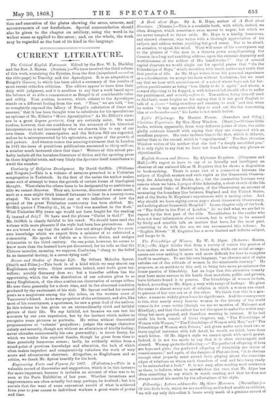The Friendships of Women. By W. R. Alger. (Roberts :
Boston, U.S.)—Mr. Alger thinks that from a variety of causes the passion of love excites an undue interest in these days, while our social arrange- ments are ever making it more and more difficult for love to complete itself in marriage. To use his own language, "an obscure mist of sighs exhales out of the solitude of women in the nineteenth century." He proposes, as an antidote to this evil, to bring into more prominence the lesser passion of friendship. Let us hope that this alterative remedy may have more success in his hands than moralists, public and private, have hitherto found it to possess. The friendships of women include, indeed, according to Mr. Alger, a very wide range of feelings. Ho gives the name to almost every sort of relation in which a woman can stand to persons of her own sex or of the other. Wo think that this is a pais- take ; ammo so widely given loses its significance. And the consequence is this, that nearly every famous woman in the history of the world comes in for some notice (though we see no mention of Mehemet and lihadijah), and that the author has not the space to make the notice any- thing but most general, and therefore wanting in interest. If he had made his book consist of three chapters, say,'The Friendships of Women with Women," "The Friendships of Women with Men," and "The Friendships of Women with Priests," and given under each head two or three typical instances with full detail, ho would, we think, have done much better. Of Mr. Alger's style we cannot speak with much praise. Indeed, it is not too much to say that it is often extravagant and absurd. We may quote the following :—" The perfected offspring of love are boys and girls ; the perfected offspring of friendship are states of consciousness ;" and again, of the dangers of Platonic love, "it is obvious enough what jeopardy must attend their playing about the conscious edges of relations on whom such thunders of soul and fate hang ready to be unleashed at a look." It is not easy, after reading such sentences as these, to believe, what is neventholoss the cas3, that Mr. Alger has often something to say which is worth reading, and that he does not always conceal his merits by the affectations of his style.






























 Previous page
Previous page